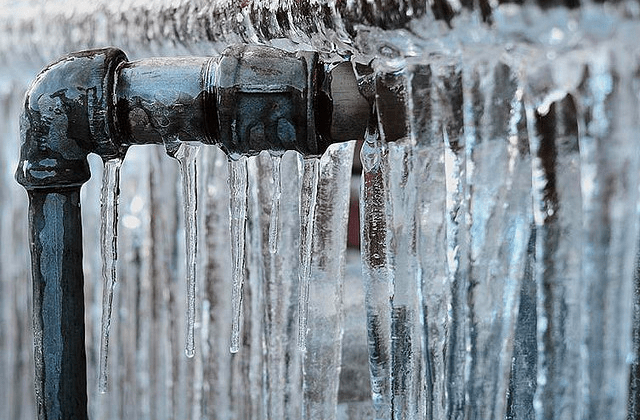Ways to Protect Pipes from Freezing: Specialist Advice
Ways to Protect Pipes from Freezing: Specialist Advice
Blog Article
Right here down the page you can get more excellent facts related to Preventing and dealing with frozen pipes.
.jpg)
Winter can ruin your pipes, specifically by freezing pipelines. Below's just how to stop it from taking place and what to do if it does.
Intro
As temperature levels decrease, the danger of frozen pipelines rises, possibly causing expensive repair services and water damages. Comprehending how to stop icy pipes is crucial for home owners in chilly climates.
Avoidance Tips
Insulating at risk pipes
Cover pipes in insulation sleeves or make use of heat tape to secure them from freezing temperatures. Concentrate on pipelines in unheated or outside locations of the home.
Heating methods
Maintain interior areas adequately heated up, especially locations with plumbing. Open up cupboard doors to permit cozy air to distribute around pipes under sinks.
How to identify icy pipes
Seek decreased water flow from taps, uncommon odors or noises from pipelines, and visible frost on subjected pipes.
Long-Term Solutions
Architectural modifications
Consider rerouting pipes far from exterior walls or unheated areas. Add additional insulation to attics, cellars, and crawl spaces.
Updating insulation
Purchase top notch insulation for pipes, attic rooms, and wall surfaces. Proper insulation helps preserve consistent temperature levels and minimizes the risk of icy pipes.
Shielding Outside Pipes
Garden tubes and outside taps
Disconnect and drain pipes garden pipes prior to winter season. Mount frost-proof spigots or cover outside taps with insulated caps.
Comprehending Icy Pipelines
What causes pipes to freeze?
Pipelines ice up when revealed to temperatures below 32 ° F (0 ° C) for prolonged periods. As water inside the pipelines ices up, it broadens, taxing the pipeline walls and potentially triggering them to rupture.
Threats and damages
Frozen pipes can lead to supply of water disturbances, property damage, and expensive repairs. Ruptured pipes can flooding homes and create extensive architectural damage.
Indications of Frozen Water Lines
Identifying frozen pipelines early can avoid them from bursting.
What to Do If Your Pipes Freeze
Immediate actions to take
If you suspect frozen pipes, keep taps open to ease pressure as the ice melts. Use a hairdryer or towels soaked in warm water to thaw pipes gradually.
Conclusion
Protecting against frozen pipes calls for proactive procedures and fast responses. By comprehending the causes, indicators, and safety nets, homeowners can safeguard their plumbing during cold weather.
Helpful Tips to Prevent Frozen Pipes this Winter
UNDERSTANDING THE BASICS: WHY PIPES FREEZE AND WHY IT’S A PROBLEM
Water freezing inside pipes is common during the winter months, but understanding why pipes freeze, and the potential problems it can cause is crucial in preventing such incidents. This section will delve into the basics of why pipes freeze and the associated problems that may arise.
THE SCIENCE BEHIND FROZEN PIPES
When water reaches freezing temperatures, it undergoes a physical transformation and solidifies into ice. This expansion of water as it freezes is the primary reason pipes can burst. As the water inside the pipe freezes, it expands, creating immense pressure on the walls. If the pressure becomes too great, the pipe can crack or rupture, leading to leaks and water damage.
FACTORS THAT CONTRIBUTE TO PIPE FREEZING
Low Temperatures: Extremely cold weather, especially below freezing, increases the risk of pipes freezing. Uninsulated or Poorly Insulated Pipes: Pipes located in unheated areas, such as basements, crawl spaces, or attics, are more prone to freezing. Insufficient insulation or lack of insulation altogether exacerbates the problem. Exterior Wall Exposure: Pipes running along exterior walls are susceptible to freezing as they encounter colder temperatures outside. Lack of Heating or Temperature Regulation: Inadequate heating or inconsistent temperature control in your home can contribute to frozen pipes. PROBLEMS CAUSED BY FROZEN PIPES
- Pipe Bursting: As mentioned earlier, the expansion of water as it freezes can cause pipes to burst, resulting in significant water damage.
- Water Damage: When pipes burst, it can lead to flooding and water damage to your property, including walls, ceilings, flooring, and personal belongings.
- Structural Damage: Prolonged exposure to water from burst pipes can compromise the structural integrity of your home, leading to costly repairs.
- Mold and Mildew Growth: Excess moisture from water damage can create a favorable environment for mold and mildew growth, posing health risks to occupants.
- Disrupted Water Supply: Frozen pipes can also result in a complete or partial loss of water supply until the issue is resolved.
WHY CERTAIN PIPES ARE MORE PRONE TO FREEZING
- Location: Pipes located in unheated or poorly insulated areas, such as basements, crawl spaces, attics, or exterior walls, are at higher risk of freezing.
- Exterior Pipes: Outdoor pipes, such as those used for irrigation or exposed plumbing, are particularly vulnerable to freezing as they are directly exposed to the elements.
- Supply Lines: Pipes that carry water from the main water supply into your home, including the main water line, are critical to protect as freezing in these lines can affect your entire plumbing system.
- Underground Pipes: Pipes buried underground, such as those connected to sprinkler systems or outdoor faucets, can be susceptible to freezing if not properly insulated.
https://busybusy.com/blog/helpful-tips-to-prevent-frozen-pipes-this-winter/

As an enthusiastic reader on Prevent Frozen Pipes , I assumed sharing that piece of content was essential. Sharing is nice. You won't know, you may very well be doing someone a favor. Thanks for your time invested reading it.
Schedule Appointment Report this page